Today In History: Election Day

Democracy in the contemporary world demands, among other things, an educated and informed people.
-- Elizabeth Bishop, Brazil, Chapter 9, p.127.
As we head into Election Day 2024, we take stock of its history and appreciate the importance of creating a vigorous and knowledgeable citizenry with an effective government that will help strengthen society and address the pressing challenges of our time, including health care, immigration, economy, climate, and education. So far, from early polls, it's a tight race between current Vice President Kamala Harris and former President Donald Trump, and every vote counts until the polls close on Tuesday, November 5th, be it 9pm ET in New York or 1am ET in Alaska. Exercise your right, privilege, or responsibility -- and vote -- and also learn about Election Day.
In January 1845 President Zachary Tyler signed a bill that set the first Tuesday after the first Monday in November as the day for presidential election, which occurs every four years in the United States. Congress decreed that states must vote for both the President and Vice President, and by 1872, followed suit with the same date for the election of its own members to the Senate and House of Representatives.
Why November, and why Tuesday? It was believed that autumn harvest was nearing completion and the majority of farmer citizens benefited from a day or two to travel to their polling places, without disrupting their attendance at Sunday church services.
Before the voting schedule became more uniform, Congress allowed all states to hold their elections any time 34 days prior to the meeting of the Electoral College on the first Wednesday in December -- often opening up room for fraud in which people moved from state to state in close elections to influence results. Since 1824, the popular vote has indirectly indicated the winner of a presidential election by determining the electoral vote, since each state or district's popular vote decides its electoral college vote.
The following articles are drawn from Proquest Historical Newspapers, which informs and inspires classroom teaching and learning.
- Topics of the Times: Election Day Fixed by Congress -- The "Full Dinner Pail." (1900, Aug 29). The Sun (1837-)
- Election Day: The Story of How It Came to Be Fixed on Tuesday in November. (1900, Oct. 03). The Washington Post (1877-1922)
- Voting Days Varied Greatly: Present Date Fixed in 1845 --- Tuesday After First Monday in November New York Idea. (1915, Feb 14). Boston Daily Globe (1872-1922)
- Historic Light on the 20th Amendment. (1933, Jan 29). New York Times (1923-)
- Gallup, G. (1947, Nov 01). Most Voters Favor Holiday on Presidential Election Day. The Washington Post (1923-1954)
- Here's Why November Was Chosen for Voting. (1954, Nov 02). New York Times (1923-)
- As the Nation Goes, So Goes Maine. (1957, Sep 15). The Hartford Courant (1923-)
- Lanahan, S. (1966, Nov 07). News to Me ...: Election Day Got Vote in 1845. The Washington Post, Times Herald (1959-1973)
- How Election Day Set. (1974, Apr 11). The Austin American - Statesman (1973-1980)
- Grier, P. (2010, Nov 02). Election Day 2010: Why We Always Vote on Tuesdays: Election Day 2010: Federal Elections Are Always on the First Tuesday After the First Monday in November, Just Like It Has Been Since 1845. The Christian Science Monitor (1908-)

Tips:
- Aldrich, John. The Many Faces of Strategic Voting : Tactical Behavior in Electoral Systems Around the World. Ed. by Andre Blais, John H. Aldrich, and Laura Beth Stephenson. Ann Arbor, Michigan: University of Michigan Press, 2018. e-book.
- Boyte, Harry Chatten. Everyday Politics : Reconnecting Citizens and Public Life. 1st ed. Philadelphia: University of Pennsylvania Press, 2004. e-book.
- Cain, Bruce E, Todd Donovan, and Caroline J Tolbert. Democracy in the States : Experiments in Election Reform. Washington, D.C: Brookings Institution Press, 2008. e-book.
- Leighley, Jan E et al. Who Votes Now? : Demographics, Issues, Inequality, and Turnout in the United States. Course Book. Princeton, NJ: Princeton University Press, 2013. e-book.
- Maloof, Torrey. Understanding Elections. Level 3-5. 1st ed. Huntington Beach, California: Shell Education, 2015. e-book.
- Watch: How Will the 2024 Election Impact Education? , Teachers College Newsroom, Monday, October 28th, 2024.
Images:
- Vote: Message for U.S. Citizens, Courtesy of GPA Photo Archive
- Poster Image: Casting a Ballot, Courtesy of Canva
Need to keep current, look to the past, teach a topic? The Everett Cafe features daily postings of news from around the world, and also promotes awareness of historical events from an educational context. Be sure to check additional Cafe News postings on the library blog.

